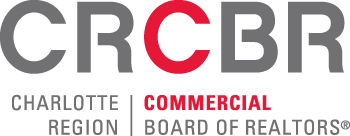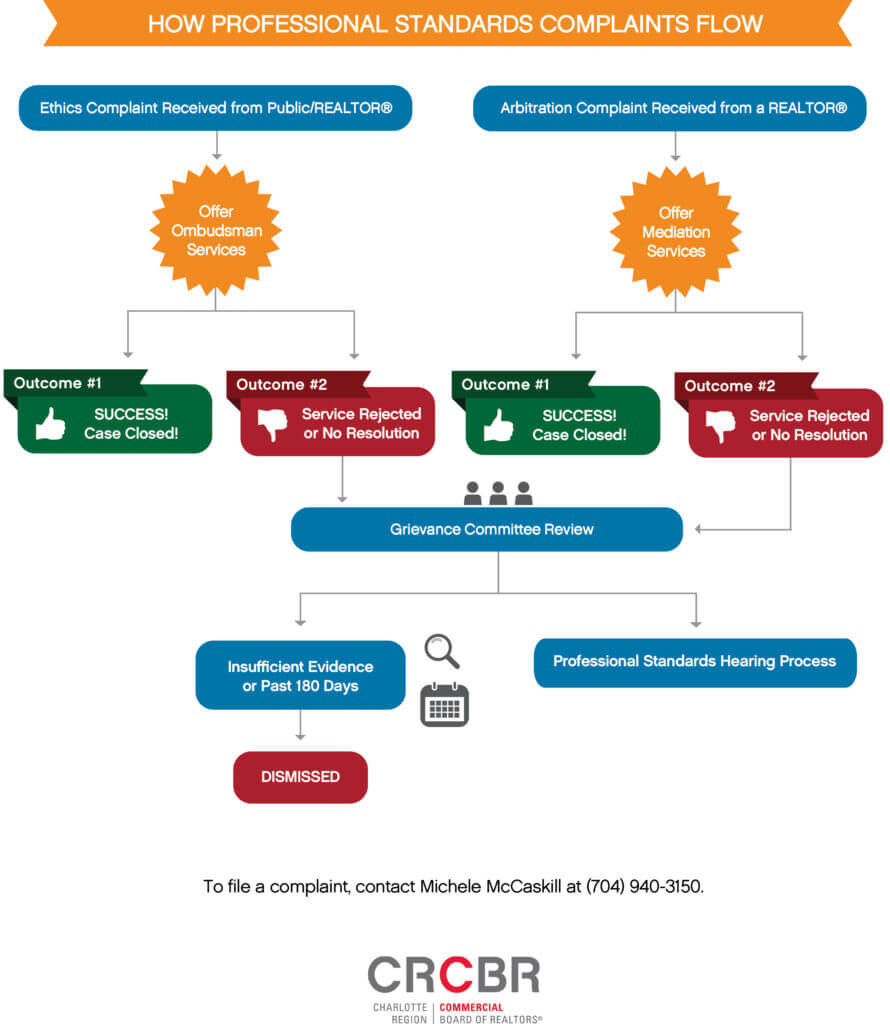Professional Standards
The Grievance Committee and the Professional Standards Committee both fall under CRCBR’s Professional Standards. These committees are responsible for ensuring due process in the conduct of hearings to enforce the Code of Ethics and in the arbitration of business disputes arising out of the real estate business.
CRCBR offers its members mediation services, as well as the ability to file ethics complaints and arbitration requests through these respective committees.
Although no party to an arbitrable matter can be required to submit to mediation, it is a useful tool in resolving the conflicts that arise involving members and their clients and customers. Mediation can resolve disputes and promote amicable resolutions.
Upon receipt of an inquiry for arbitration, ombudsman and/or mediation is offered as a voluntary option. Like arbitration, the statute of limitations for filing a mediation is 180 days from the time that you could have known there was a dispute.
To file for mediation, a request must be filed using the Request to Mediate. Your form and a supporting document with a narrative or chronological summary of the events must be filed with Michele McCaskill, Professional Standards Administrator (mmccaskill@canopyrealtors.com or 704-940-3150). After receiving the request from the complainant, the respondent is notified and mutual agreement to mediate must be received. If consent is not received, the complainant will then proceed with filing an arbitration request.
If both parties agree to mediation, a mediation officer is selected and a date for mediation is set. This is typically scheduled at the CRCBR offices or the offices of CRCBR’s attorney, at a time convenient for all parties.
During the mediation, any party may withdraw from the process at any point prior to reaching an agreement. Any offers of settlement that were not accepted or any suggestion resolution proposed by the Mediation Officer that was not accepted will not be introduced as evidence nor consider in any matter should it be arbitrated.
If the parties agree to a settlement of the dispute, and the settlement has been reduced to writing and signed by all the parties, the matter is deemed resolved and cannot be subject to a subsequent arbitration hearing. If either of the parties fails to abide by the terms of the settlement, the other party should be encouraged to have the settlement agreement judicially enforced by a court of competent jurisdiction.
To file an arbitration, a request must be filed using Request and Agreement to Arbitrate. Your Request and Agreement to Arbitrate should include a supporting document in the form of a narrative or chronological summary of the events that occurred. Submit it to Michele McCaskill, Professional Standards Administrator for the Charlotte Region Commercial Board of REALTORS® (CRCBR), along with a check for $500 payable to CRCBR, for the arbitration deposit (collected from each party). A copy of your Request and Agreement to Arbitrate will then be sent to the respondent, who has 14 days to submit a response and deposit.
Once the response is received by CRCBR, the case is sent to the CRCBR Grievance Committee Chair for the assignment of a panel to conduct a review. This panel’s responsibility is to review the case, and based on a certain set of guidelines they must follow, will determine if the case should be referred to hearing or dismissed.
If the case is referred to a hearing, the CRCBR Professional Standards Committee will appoint a panel to hear the case and determine how the money dispute should be resolved. Arbitration is binding. The hearing is typically held at a time convenient for all parties.
If referred to a hearing, this process usually takes about two months since we must allow reasonable time for responses, for action by the Grievance Committee, and scheduling.
FAQs for Arbitrations
Q: Is there a statute of limitations for filing arbitration requests?
A: Yes. 180 days from the time that you could have known there was a dispute.
Q: I’d like to file a complaint but am worried about confidentiality.
A: All arbitrations are kept strictly confidential. Only staff involved in the administration of cases, along with the assigned members from the Grievance and Professional Standards Committees, have access to arbitration cases.
Q: Is there a special form I should use when filing a request for arbitration?
A: File an arbitration request using Request and Agreement to Arbitrate. The form should include a supporting document in the form of a narrative or chronological summary of the events that occurred.
Q: Where do I submit the arbitration request?
A: If your request for arbitration is with another member of CRCBR, submit the request to Michele McCaskill, Professional Standards Administrator (Michele.McCaskill@carolinahome.com or 704-940-3150).
Q: Is there a cost to request arbitration?
A: Yes. Both parties submit a $500 filing fee; the prevailing party’s fee is returned, and the remainder used to cover the cost of the hearing. If the case does not go to a hearing, filing fees are returned.
Q: How do I know whether to file an ethics complaint or request arbitration?
A: Ethics complaints are filed about behavior; arbitration is requested when there is a commission dispute.
Q: Can I file an arbitration request and an ethics complaint at the same time?
A: Yes. Both case types can be filed at the same time. If the cases go to a hearing, arbitration hearings are held first.
Q: Will the person who I’m filing against be notified of my complaint?
A: Yes. Once your request has been submitted to CRCBR and reviewed by the Grievance Committee, it is sent to the respondent for a reply.
Q: Who establishes the rules that CRCBR follows in handling arbitrations?
A: CRCBR is required to follow the rules of the Code of Ethics and Arbitration Manual of the National Association of REALTORS®.
Q: How long does the process take?
A: If arbitrations go to a hearing, the process may take up to two (2) months. This is because of the time that must be allowed for responses, proper notification, and scheduling.
Q: Is arbitration binding?
A: Yes. Members agree to abide by the Code of Ethics, which includes binding arbitration.
Q: Do I have to use CRCBR’s arbitration if I have a commission dispute?
A: Yes. The Code of Ethics requires members to first submit to arbitration before taking a dispute to the civil courts.
To process an ethics complaint, a formal complaint must be filed using the Ethics Complaint Form. As you complete the form, refer to the Code of Ethics of the National Association of REALTORS® to determine which Article(s) you believe has been violated. Your complaint should include a supporting document in the form of a narrative or chronological summary of the events that occurred.
Submit the Ethics Complaint Form and supporting document to Michele McCaskill, Professional Standards Administrator (mmccaskill@canopyrealtors.com or 704-940-3150).
The Grievance Committee will review the case and, based on guidelines they must follow, will determine if the case should be referred to hearing or dismissed.
If the case is referred to a hearing, the CRCBR Professional Standards Committee will appoint a panel to hear the case and determine if the Code of Ethics has been violated. The hearing is set for a time convenient for all parties.
If the panel determines there has been a violation, they will take disciplinary action. Disciplinary sanctions can include the completion of an education class on a given topic, fines, letters of warning and reprimand, suspension, or termination of membership.
The hearing process typically takes about two months to complete as we must allow reasonable time for responses, action by the Grievance Committee, and scheduling.
Before you file an Ethics Complaint, read this.
FAQs for Ethics Complaints
Q: Is there a statute of limitations for filing ethics complaints?
A: Yes. 180 days from the time that you could have known there was a dispute.
Q: How do I know whether to file an ethics complaint or request arbitration?
A: Ethics complaints are filed about behavior; arbitration is requested when there is a commission dispute.
Q: Can I file an arbitration request and an ethics complaint at the same time?
A: Yes. Both case types can be filed at the same time. If the cases go to a hearing, arbitration hearings are held first.
Q: Is there a cost to file an ethics complaint?
A: No.
Q: I’d like to file a complaint, but am worried about confidentiality.
A: All ethics complaints are kept strictly confidential. Only staff involved in the administration of cases, along with the assigned members from the Grievance and Professional Standards Committees, have access to ethics complaints.
Q: Is there a special form I should use when filing an ethics complaint?
A: File an ethics complaint using Ethics Complaint Form E-1. The Ethics Complaint Form should include a supporting document in the form of a narrative or chronological summary of the events that occurred.
Q: Where do I submit the ethics complaint?
A: If your complaint is against a member of CRCBR, submit the complaint to Michele McCaskill, Professional Standards Administrator (mmccaskill@canopyrealtors.com or 704-940-3150).
Q: Will the person who I’m filing against be notified of my complaint?
A: Yes. Once your complaint has been submitted to CRCBR and reviewed by the Grievance Committee, it is sent to the respondent for a reply.
Q: How do I know which Article of the Code of Ethics to name in my complaint?
A: The Code of Ethics includes Standards of Practice which explain the types of behavior covered by each Article.
Q: Do I name the Article or Standard of Practice in my complaint?
A: Ethics complaints should be filed based on the Articles of the Code of Ethics.
Q: How do I know where to file the ethics complaint?
A: Ethics complaints are filed with the Board/Association where the responding party holds membership.
Q: Who establishes the rules that CRCBR follows in handling ethics complaints?
A: CRCBR is required to follow the rules of the Code of Ethics and Arbitration Manual of the National Association of REALTORS®.
Q: How long does the process take?
A: If ethics complaints go to a hearing, the process may take up to two (2) months. This is because of the time that must be allowed for responses, proper notification, and scheduling.
Q: What happens if someone is found in violation of an Article of the Code of Ethics?
A: If the hearing panel finds that a member is in violation of the Code of Ethics, they have the authority to recommend that the Board of Directors impose disciplinary sanctions such as the completion of an education class on a given topic, fines, letters of warning and reprimand, suspension, or termination of membership.

